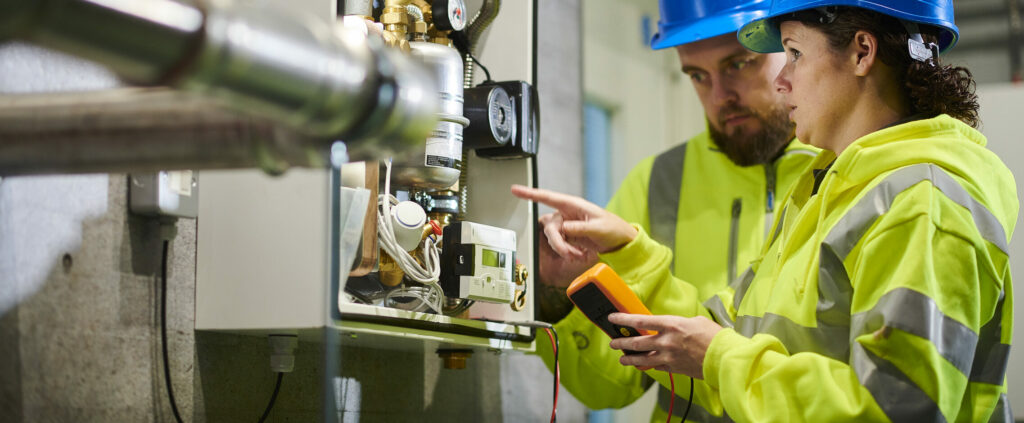Loan and Capacity Development
Learn more about lending opportunities and capacity development programs
Capacity Development Program
The Drinking Water State Revolving Fund (DWSRF) aims to assist publicly owned and privately owned community water systems and nonprofit noncommunity water systems to finance the cost of the infrastructure needed to achieve or maintain compliance with Safe Drinking Water Act requirements and to protect the public health in conformance with the objectives of the Safe Drinking Water Act. The DWSRF is administered as a component of the Environmental Infrastructure Financing Program, which also administers the State’s Clean Water State Revolving Fund. The annual intended use plans (IUP) filed each year with the USEPA, which are open to public comment, describe how the State intends to spend federal grant moneys, including eligible projects and non-project set-aside expenditures. The DWSRF program updates project priority system and project priority lists, verifies capacity development for project sponsors, assists in the development of SRF policies and procedures, and coordinates and prepares work plans for non-project set-aside expenditures.
Capacity Development Program
The Capacity Development Program aims to reduce existing public water systems in significant non-compliance with the Federal and State Safe Drinking Water Act regulations, and prevent formation and operation of any community or non-transient, non-community water systems that may be non-viable. It promotes or maintains water systems’ technical, managerial, and financial capacity in part by providing accurate, timely, and appropriate information.
The 1996 Amendments to the Federal Safe Drinking Water Act, Section 1420 (a), provide that each state shall have legal authority to ensure that all new public community water systems and public non-transient, non-community water systems demonstrate adequate technical, managerial, and financial capacity. In New Jersey, 1999 legislation (P.L.1999 Chapter 176) amended the New Jersey Safe Drinking Water Act (N.J.S.A. 58:12A) to give New Jersey explicit legal authority to require new community and non-transient non-community water systems to demonstrate capacity, implemented in a new rule at N.J.A.C. 7:10-13 effective August 21, 2000. The USEPA approved New Jersey’s Capacity Development Strategy on September 28, 2000, which it has been implementing with the Drinking Water State Revolving Fund as its primary source of funding. The NJDEP is allowed to set aside up to 10% of each capitalization grant for State program management activities, which includes establishing and funding the Capacity Development Program.
SRF Loan Program Reports
Access historical information on SRF loans
Capacity Development Program
Learn more about our capacity development program, access forms and publications and find out more about our small water system technical assistance program
Capacity development is a fundamental component of the 1996 Safe Drinking Water Act (SDWA) Amendments. The SDWA Amendments provide a framework for states and water systems to work together to protect public health. The Capacity Development Program aims to reduce existing public water systems in significant non-compliance with the Federal and State Safe Drinking Water Act regulations.
Capacity Development is a process for water systems to acquire and maintain adequate technical, managerial, and financial (TMF) capacity. TMF capacity enables water systems to have the capability to consistently provide safe drinking water to the public. Besides protecting public health, communities that support their water systems are making long-term investments in sustainable communities and economic well-being.
The NJDEP is allowed to set aside up to 10% of each capitalization grant for State program management activities, which includes establishing and funding the Capacity Development Program.
Capacity Development Forms
- Financial Declaration Form for New Non-Transient Non-Community Public Water Systems
- Two-Part Pump Test Form for New Non-Transient Non-Community Public Water Systems
- Technical Manual for Determining Reliable Yield for Nontransient Noncommunity Public Water Systems
- Technical, Managerial, & Financial Capacity of New Public Community Water Systems (BSDW-PA 18)
- Technical, Managerial, & Financial Capacity of New Public Non-Community Water Systems (BSDW-PA 19)
Technical Assistance
This program helps public water systems serving less than 10,000 persons by 1) providing for free group training sessions, 2) conducting outreach site visits, and 3) conducting sampling that is not part of a system’s routine monitoring to detect problems or deficiencies that would otherwise go unnoticed. This was authorized by the 1996 Federal Safe Drinking Water Act, which required that States use 2% of their Federal capitalization grant from the Drinking Water State Revolving Fund to assist small water systems. Nearly two-thirds of about 600 public community water systems, and almost all of about 3,000 public non-community water systems, serve less than 10,000 persons, so there are about 3,400 small water systems in New Jersey.
DEP has contracted with the New Jersey Water Association (NJWA) to conduct free group training sessions in the Northern, Central and Southern Regions of New Jersey on such topics as Basic Accounting, Consumer Outreach, Distribution Planning and Safe Drinking Water Act Requirements, among other topics. NJWA is a non-profit association and a State affiliate of the National Rural Water Association; its membership is largely small water systems and therefore the training topics are mainly on issues affecting small water systems, but all are welcome at the training sessions. These training sessions also provide operators of small water systems with continuing education credit needed for license renewal. Registration information for training sessions is available at www.njwater.org or contact NJWA at (609) 242-7111.
- Provide technical support services to assist water systems develop:
- Technical, Managerial, & Financial (TMF) Evaluations
- Asset Management Plans (AMPs)
- Capital Improvement Plans (CIPs)
- Assess systems to identify DWSRF eligible projects.
- Assist with filling a DWSRF application Planning and design costs may or may not be covered in advance of a DWSRF loan.
- Provide technical support services to assist water systems to develop:
- Lead Service Line Inventories (LSLIs) and Plans
- Capital Improvement Plans (CIP) for Lead Replacement
- Identify LSLR projects eligible for Drinking Water State Revolving Fund (DWSRF) funding.
- Assist with filing DWSRF Application.
- Provide assistance with solicitation and outreach to stakeholders to generate interest in the SRF (State Revolving Fund) program.
- Assist with development of educational materials outlining how to apply and obtain a SRF loan.
- Coordinate with NJDEP on distribution, solicitation, and outreach to generate interest in SRF program.



